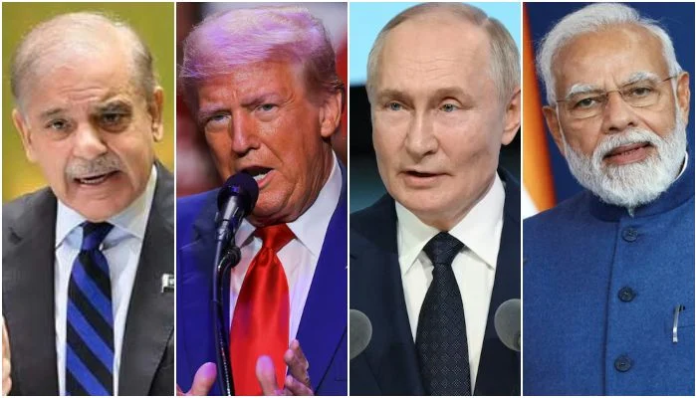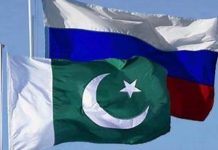After remaining in the world headlines, the recent armed conflict between Pakistan and India continues to have geopolitical reverberations as the issue once came under discussion during the recent telephonic conversation between US President Donald Trump and Russian President Vladimir Putin.
“The Middle East was discussed, as well as the armed conflict between India and Pakistan, which has been halted with the personal involvement of President Trump,” said Russian president’s aide Yuri Ushakov in a statement issued by the Kremlin on Wednesday.
The two presidents, a day earlier, had discussed various issues during their approximately one hour and 15 minute-long telephone call including the ongoing war in Ukraine where President Putin stressed that Moscow would respond to recent attacks on its airbases.
However, the discussion of the recent limited conflict between Islamabad and New Delhi comes against the backdrop of cross-border skirmishes between the two nuclear-armed neighbours raised eyebrows worldwide prompting Washington to intervene with President Trump announcing a ceasefire which was widely praised.
The military confrontation between Pakistan and India — which included cross-border strikes by both countries — came weeks after 26 tourists were killed in Indian Illegally Occupied Jammu and Kashmir’s (IIOJK) Pahalgam and India falsely blamed Pakistan for the attack.
After the incident, India killed several innocent civilians in unprovoked attacks on Pakistan for three days before the Pakistan Armed Forces retaliated in defence with the successful Operation Bunyan-um-Marsoos.
Pakistan downed six IAF fighter jets, including three Rafale, and dozens of drones. After at least 87 hours, the war between the two nuclear-armed nations ended on May 10 with a ceasefire agreement brokered by the United States.
Since the US-brokered ceasefire that followed, both Islamabad and New Delhi have undertaken a diplomatic outreach initiative globally to present their respective stance on the recent clashes between the arch-rivals.
For Pakistan, former foreign minister and Pakistan Peoples Party (PPP) Chairman Bilawal Bhutto-Zardar is leading a nine-member high-level parliamentary delegation across several countries to present to the world Pakistan’s stance on the recent military confrontation with India and to challenge New Delhi’s narrative at the international level.
Members of the parliamentary delegation include Hina Rabbani Khar, Sherry Rehman, Dr Musadik Malik, Khurram Dastgir Khan, Jalil Abbas Jilani, Tehmina Janjua, Bushra Anjum Butt and Syed Faisal Subzwari.
Speaking to the Overseas Pakistani community in New York, Bilawal warned of the grave risks of escalation in South Asia, highlighting that any future miscalculation could trigger a nuclear conflict with global consequences.
A nuclear conflict has implications for the entire world, the politician said, adding that it was, therefore, all the more important for Pakistan to present its case, to urge the international community to continue to play its role just as it did during the ceasefire and prevail upon India to abandon its strategy and instead agree to engage in a composite comprehensive dialogue with Pakistan.
The young politician also raised the issue of Kashmir as a “key component of any comprehensive dialogue” with India, stressing that the Kashmir dispute cannot be ignored.
Meanwhile, during an interview China’s CCTV News, the former FM stressed the need for a permanent, joint investigative forum between India and Pakistan to probe not just the Pahalgam attack, but all terror incidents affecting both countries.
“A neutral platform could help both sides seek justice and prevent future bloodshed,” he remarked.
Reaffirming Pakistan’s commitment to peace, Bilawal said any military response had been in self-defence.
His remarks for talks between the two countries echo his earlier statement urging the international community to push India towards a comprehensive dialogue with Pakistan, warning that the recent military escalation between the two nuclear-armed neighbours has dangerously lowered the threshold for conflict.
The possibility of dialogue between Pakistan and India has also been hinted at by India’s Congress MP Shashi Tharoor, who recently led an all-party parliamentary delegation to Brazil, and has said that New Delhi would be open to talks with its neighbour only if Islamabad takes demonstrable action against the “infrastructure of terrorism that is visible everywhere” within its borders.

















